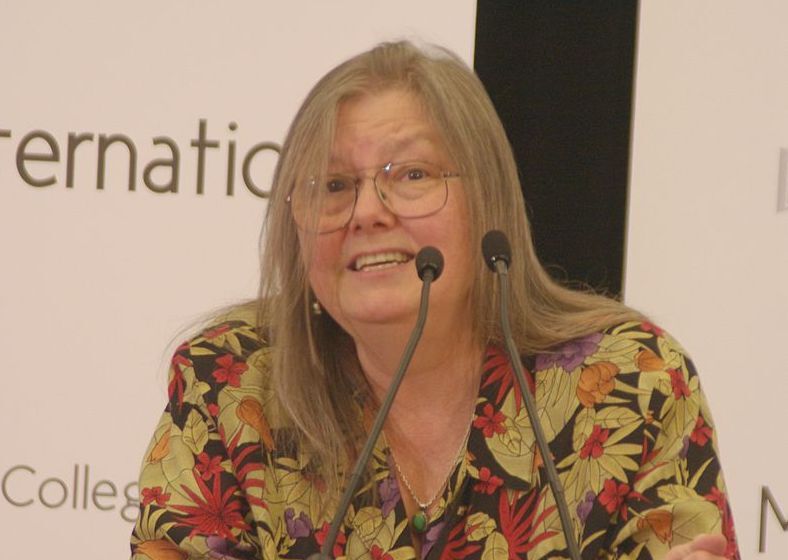Last night I fell down an internet rabbit hole. A friend posted a screenshot of an announcement that Dorothy Allison, femme lesbian working-class feminist writer from the U.S. South and author of the acclaimed semi-autobiographical novel Bastard Out of Carolina, had died at age 75, and was wondering if anyone else had seen anything. Usually my online sleuthing skills are pretty good, but anything I could find was on X, and every post seemed to be citing this tweet from Black queer poet Sapphire (who is most well known for her book Push, which was later adapted into the film Precious). Since I wasn’t initially sure whether Sapphire’s X account was genuine, I couldn’t tell whether the news of Allison’s passing was real.
Hours later, Allison’s Wikipedia entry was updated to say she had passed, but with no citation. I wanted to post something; I also remembered a few years back when local performance artist Nina Arsenault was memorialized on Instagram, only to have her surface and announce that she was, in fact, alive. The fact that there were no reliable reports on the matter made me think about the state of feminist media; the fact that there was no reliable mainstream media reporting on her death made me think about how mainstream media doesn’t actually care about queers who don’t strive to be conventionally respectable.
When feminist sexuality writer and longtime friend of Allison’s Susie Bright posted on her blog, I believed it (and FWIW, Sapphire’s account does, indeed, seem to be real). It made me think we really need to bring back blogs. It made me think I need to be paying much more attention to queer feminist writers in their 60s and 70s while they’re here.
Dorothy Allison wrote about class struggle, the rural South, sexual abuse, lesbian sexuality and more. She is cited widely as an influence of younger femme activists and writers, alongside other white anti-racist working-class femmes, like Joan Nestle and Minnie Bruce Pratt, the latter of whom passed in July.
Allison is known for her writing about difficult topics and her deep understanding and depictions of femme identity, lesbian perversion and butch-femme sex. She is most well known outside of queer circles for Bastard Out of Carolina, which was published in 1992 and turned into a feature film directed by Angelica Huston in 1996. By this morning, the femme writers I know, ones I read and ones I follow were posting emotional tributes to Allison; I noticed that there was still a lack of media about her passing, and seemingly like her impact was not known beyond a couple of generations of queers.
Here are five things to know about Dorothy Allison:
It’s not all novels
While Allison derives her most mainstream recognition for Bastard Out of Carolina, she published collections of both poetry and short stories in the decade prior to the novel’s publication. (She published one other novel, Cavedweller, and was reported to be working on another in the mid-2000s.) She also penned a memoir and a book of essays. Check out the short story collection Trash for what feels like the most quintessential Allison; find yourself a copy of Two or Three Things I Know for Sure for an examination of Allison’s family; Conversations with Dorothy Allison, edited by Mae Miller Claxton, is Allison in her own words, on life, literature and her complex relationship with her role as a public figure.
She’s mafia
Lesbian Sex Mafia, that is. Allison co-founded the LSM in 1981 with Jo Arnone, and the New York City group continues to operate today. A hub for support and education about BDSM, LSM is inclusive, boundary-pushing and currently the longest continuously running organization of its kind in the U.S.
She’s Wikipedia gospel
Now, of the many, many, wonderful, smart, influential things Allison has said and done, her being enshrined on the Wikipedia page for “lesbian” is far from the most important. But, it proves something that she’s cited as proof of lesbian literature’s values changing after Stonewall, specifically because of her writing about childhood sexual abuse and “deliberately provocative lesbian sadomasochism themes.”
Militant feminists made her write
It’s widely documented that Allison cut ties with her family of origin for a decade through the ’70s, during which she became a part of the women’s movement of the time, including spending time in a lesbian-feminist collective. Allison has said that she was, at the time, inclined to abandon her writing but it was the people she met in this context who pushed her to continue, allowing for her flourishing career.
She shunned respectability politics
When queers talk about dreaming of a world that includes us, on our own terms, some people are talking about representation on bank ads, but many of us are not. In her essay “A Question of Class,” published in her 1994 book of essays, Skin: Talking About Sex, Class, and Literature, Allison writes: “The kind of woman I am attracted to is invariably the kind of woman who embarrasses respectably middle-class, politically aware lesbian feminists. My sexual ideal is butch, exhibitionistic, physically aggressive, smarter than she wants you to know, and proud of being called a pervert. Most often she is working class, with an aura of danger and an ironic sense of humor. There is a lot of contemporary lip service paid to sexual tolerance, but the fact that my sexuality is constructed within, and by, a butch/femme and leather fetishism is widely viewed with distaste or outright hatred.”


 Why you can trust Xtra
Why you can trust Xtra


